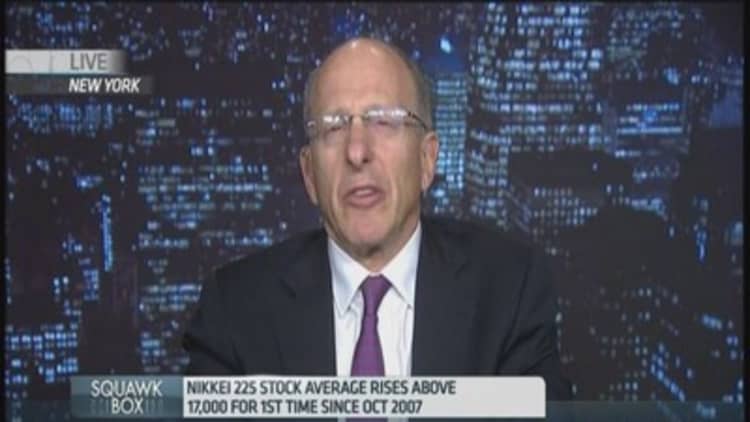
Japan stocks have been on fire since the Bank of Japan (BoJ) provided fresh ammunition to stimulate the economy, raising questions over whether the rally is sustainable beyond short-term euphoria.
The benchmark jumped 3.8 percent to 17,028 on Tuesday, its highest level since October 2007, extending Friday's 4.8 percent rally. Japan markets were closed for a national holiday on Monday.
"It absolutely is the real deal, at least for the moment," Daniel Wiener, CEO of Adviser Investments told CNBC.
"You have a sea change in the concept of risk. The government pension fund has said we're going to buy more equities and we're going to cut down on purchases of fixed income...and the market is following suit," he said.
Read MoreBOJ surprises with fresh stimulus, Nikkei surges 5%
Following the BoJ's announcement that it will expand its quantitative easing program on Friday, Japan's largest pension fund unveiled a new allocation strategy, ramping up its exposure to risky assets.
Under the new guidelines, Japanese stocks and foreign stocks will account for 25 percent of the Government Pension Investment Fund's holdings, up from 12 percent each previously. The fund will put 35 percent of its money in domestic bonds, down from 60 percent, while the ratio for overseas bonds will rise to 15 percent from 11 percent.
Jesper Koll, managing director and head of Japanese equity research at JPMorgan Securities Japan is also confident the market rally has legs.
"You do have euphoria obviously," Koll said. "But, Japan is in a structural bull market. We started in the summer of 2012, and we're less than half way done."
Read MoreGlobal markets cheer Japan's double whammy
Key drivers of the bull market are pro-growth policy activism, cheap valuations, solid earnings momentum and company management focusing on shareholder returns.
"Japan is now only country in the world where earnings are exceeding analysts' expectations," he said.
Of the companies covered by Nomura, 79 of the 201 that had reported results as of October 31 exceeded the bank's recurring profit forecasts by more than 10 percent, while 40 undershot by more than 10 percent.
With all these factors in place, Japan isn't just a "trade" it's a long-term investment, Koll said. He expects the Topix to end the year at 1,450 – 5 percent higher than current levels – before rising to 1,600 by end-2015. The index on Tuesday rose 3.6 percent to 1,381.
Read MoreTrader likens Japan stimulus to Bear Stearns event
Morgan Stanley, by comparison, expects the Topix to reach 1,500 by September 2015.
However, Amir Anvarzadeh, director of Japan equity sales at BGC notes that the current rally is being driven by investors rotating back into interest rate sensitive sectors like financials, brokers and real estate companies, and is unlikely to continue with such zest.
"The force at which this is happening is because people are positioning quickly," he said. "The gains are not going to continue at this pace – it's going to slow down."


